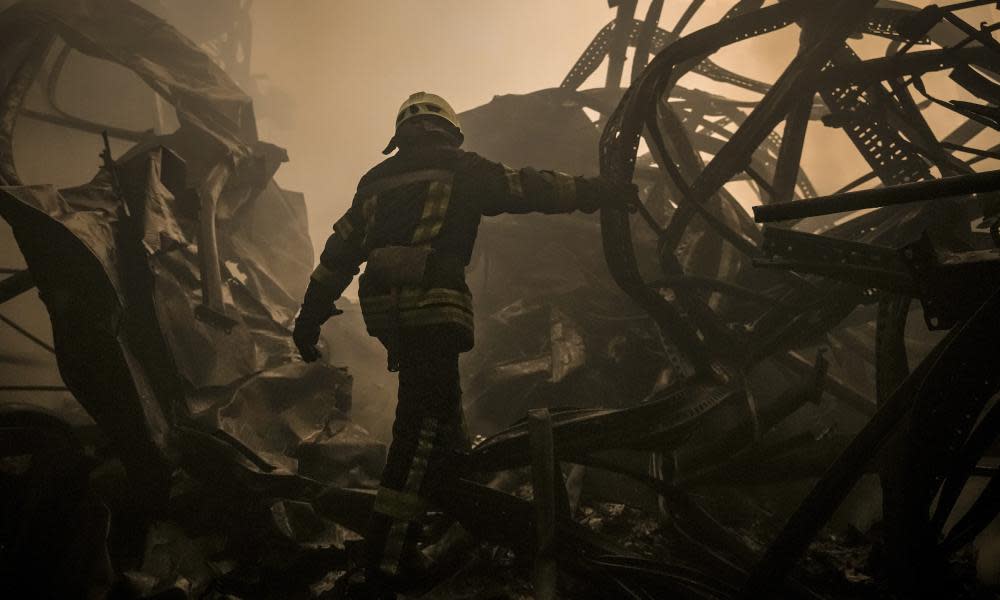Russia sends message with Yavoriv strike but attack on Poland unlikely

Analysis: proximity to Nato border may appear unnerving but steps have been taken to reinforce air defences
Russia’s deadly multiple missile strike on Ukraine’s military base in Yavoriv, less than 15 miles from the border with Poland, was clearly designed to send a message.
Not only can Russian forces strike the western limits of Ukraine, killing at least 35 people near where western arms will be crossing into the country, but the Kremlin does not care if US or other volunteer fighters were training there.
A day earlier, Russia’s deputy foreign minister, Sergei Ryabkov had said its military would treat arms shipments to Ukraine from Nato countries as “legitimate targets”.
Related: West plans to arm resistance if Russian forces occupy Ukraine
The facility, well known as a location where Nato forces trained Ukrainians in years before the war began, is near the most direct route between Rzeszow airport, where western arms are being flown in, and the city of Lviv.
It is a place where foreign volunteers are said to have congregated as they start training with Ukraine’s armed forces. But even if the base is not used or heavily used for either purpose, it is a site long viewed with suspicion by Russia.
Yet there are important limits to the Russian attack. While the proximity of lethal missile strikes to Nato borders may appear unnerving, the US and other allies have taken steps to reinforce and protect Poland’s air defences.
The US vice-president, Kamala Harris, announced at the end of last week that two US Patriot missile batteries had been moved into Poland, stationed at Rzeszow. British military sources say a companion, the medium-range Sky Sabre system, already in the country after recent exercises, may be positioned alongside them soon.
Despite Rybakov’s rhetoric, a direct Russian attack on a Nato country, with its defences recently reinforced, would be unlikely in any circumstances, but particularly so given how Moscow’s forces are struggling, losing men and materiel in their attack on Ukraine.
Nevertheless, the presence of the Patriot batteries is designed to reassure that it will be possible to intercept any stray missiles entering Polish airspace as the Russian offensive against Ukraine gets closer to the west of the country.
Romania, another Nato country bordering Ukraine, already has its own Patriot system, while Germany and the Netherlands said a few days ago they would reposition one of their own in another border country, Slovakia.
As for the supply of western arms to Ukraine, experts believe it is unlikely to be constrained by a single attack, even one as deadly as that of Sunday morning. The Polish-Ukrainian border is more than 300 miles long, and steps are being taken to conceal the vital supplies as they cross into the country and beyond.
It is not realistically possible to cut off or interdict the movement of arms with periodic airstrikes because the territory is too vast. To do so is only practical where Moscow’s forces dominate an area. For now, Russian ground troops, focused on Kyiv and the cities of east, are a long way from Lviv and the western border.
Nick Reynolds, a land warfare specialist at the Rusi thinktank, said: “[Vladimir] Putin will struggle to interdict supplies into western Ukraine, but stands a much better chance of eventually encircling and thus cutting off Kyiv, as well as potentially cutting off crossings along the Dnieper River. But this will take time.”
Russia’s dominance of the skies, particularly at night, will mean it is likely to engage in more missile attacks and show again it can strike in the west. But these do not in themselves dramatically alter the balance of the war, which is already deadly enough.

 Yahoo News
Yahoo News 
